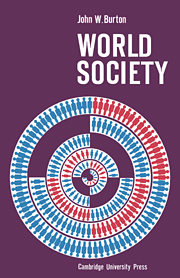6 - Self-defeating strategies
Published online by Cambridge University Press: 14 December 2009
Summary
We have looked at problems of perception, including images of world society. Our perceptions and images can be shown sometimes to be impossible. They are, typically, antagonistic and reflect suspicion and fear, even though the evidence advanced to justify such perceptions does not stand up to examination. There appear to be two influences at work, some basic element in relations between authorities that makes them suspicious of each other, and, perhaps arising out of this, assumptions and perceptions of the aggressiveness and deceit of others.
It is possible to explain the basic element of suspicion and fear of others in biological and in psychological terms, for example, the fear of the unknown, dislike of habits and customs that are foreign, a biological urge to identify with one's own ethnic groups and to be correspondingly hostile towards others. These responses could, however, be the outcome of environmental conditions. They need not necessarily be an inherent part of the organism. It is important that we should know whether hostility is an inevitable human trait, or a result of perceived conditions. If the first, then peaceful relations will require some third party control and coercion – which does not seem possible. If the second, then different sets of remedies suggest themselves, especially more knowledge about decision making processes and the avoidance of behaviour that is perceived as aggressive.
Social exchange and the differentiation of power
A sociologist has traced the way in which ordinary social exchange can leave one party to a transaction in the debt of another, and thus establish a chain of interactions that could lead to hostility and defensive postures. Most social exchange is reciprocal.
- Type
- Chapter
- Information
- World Society , pp. 79 - 90Publisher: Cambridge University PressPrint publication year: 1972



